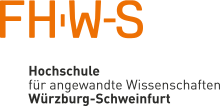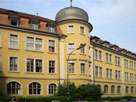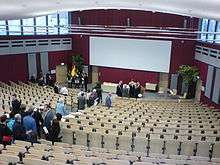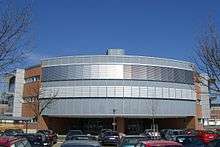University of Applied Sciences Würzburg-Schweinfurt
 Logo of the University of Applied Sciences Würzburg-Schweinfurt | |
| Type | Public |
|---|---|
| Established | 1971 |
| President | Robert Grebner |
Academic staff | 187 (2012) |
Administrative staff | 505 (2012) |
| Students | 8654 (2012). (Würzburg: 5557, Schweinfurt: 3097) |
| Location | Würzburg & Schweinfurt, Germany |
| Website |
www |
The University of Applied Sciences Würzburg-Schweinfurt (Hochschule für Angewandte Wissenschaften, formerly Fachhochschule, still abbreviated: FH|W-S) is a technical university in Germany, which was founded in 1971 and is located in Bavaria with campuses in Würzburg and Schweinfurt.
History

The history of today's University of Applied Sciences Würzburg-Schweinfurt dates back to 1807 and is linked with three previous institutions: the Balthasar-Neuman Polytechnic of the district of Lower Franconia, the Würzburg Commercial College and the Würzburg School of Applied Arts.
Following the passing of the Bavarian Technical University Law of 1970 (Bayerisches Fachhochschulgesetz or FHG), the current university opened its doors on 1. August 1971 with 1566 students and courses in seven subjects. The Würzburg campus offered courses in architecture, civil engineering, business administration and graphic design, while in Schweinfurt students could choose between electrical engineering, mechanical engineering and industrial engineering. In the following years new courses were added including social work (1972), plastics engineering (1973), computer science (1975), nursing management (1995), business economics (1998), Business informatics (2000), media management (2000), computational engineering (2003) and logistics (2008).
Between 1991 and 2000 the university developed a new campus in Aschaffenburg, initially offering business economics and from 1997 electrical engineering. In 2000, this evolved into the independent University of Applied Sciences Aschaffenburg.

On 14. February 2003, the then minister of science, Hans Zehetmair, laid a foundation for a circular teaching building in Schweinfurt extending to 3000m² and costing almost 14.5 million euros. In the basement of the building there are modern student computer pool rooms. On the first floor a spacious assembly hall (Aula) offers a venue for events and conferences. arranged in a circle around the central space are deans' offices, administrative offices and the largest auditorium of the building. On the second and third floor of the building, constructed of reinforced concrete and aluminium, there are air-conditioned multimedia rooms. The building was opened by the minister of science, Thomas Goppel, on 4. October 2004. Since then, most of the courses in Schweinfurt have been held in these new premises. The older buildings in Schweinfurt have mostly been vacated and since 2004 been extensively refurbished.
In 2006, the naming rights for the biggest lecture hall of the university (located on the Würzburg campus) were acquired by Aldi-Süd. In the same year, Sparkasse Würzburg offered to sponsor another lecture hall. Within a short time the following companies were also sponsoring buildings which were named after them:
- SALT Solutions (Würzburg)
- Fränkische Rohrwerke Königsberg (Würzburg)
- Fresenius Medical Care (Schweinfurt)
- LEONI (Schweinfurt)
- Warema-Renkhoff (Schweinfurt)
In 2008, the name of the university was changed from Fachhochschule Würzburg-Schweinfurt to Hochschule für angewandte Wissenschaften – Fachhochschule Würzburg-Schweinfurt. Since 1 May 2011 the official name of the university has been Hochschule für Angewante Wissenschaften Würzburg-Schweinfurt. However the logo with the abbreviation FH|W-S is still used.
In 2011 new buildings were acquired in both towns. In Würzburg, the new auditorium and laboratory building in Sanderheinrichsleitenweg was given to the university at the beginning of September 2011. In Schweinfurt, a new building located at Grüner Markt, opposite Kilianskirche was erected by the housing company Stadt- und Wohnbau GmbH (SWG). It cost about 9.6 million euro and the State of Bavaria has rented it from SWG for a minimum of 12 years. As second Schweinfurt campus, it accommodates 720 students in 7 auditoriums. It was officially opened on 10 August 2011.[1]
Profile
The University of Applied Sciences Würzburg-Schweinfurt is the third largest university of applied sciences in Bavaria with 8654 students (winter semester 2011/12), 187 lecturers (WS 2011/12), 20 lecturers with special tasks and 298 other members of staff. Currently, the 10 faculties offer 30 courses finishing with a diploma, bachelor or master's degree. The University of Applied Sciences Würzburg-Schweinfurt is a member of MedienCampus Bayern, the umbrella organization for media education in Bavaria. Gabriele Goderbauer-Marchner, who was teaching Media History and Media Politics in the Media Management course until 2010, was manager of MedienCampus Bayern for many years until the end of 2009.
The following degree courses are taught:
Departments in Würzburg
- Architecture (BA)
- Civil Engineering (BA)
- Business Economics (BA)
- Building Project Management (MA)
- E-Commerce (BA)
- Technical Journalism and Corporate Communication (MA)
- Translation (Economics/Technology) (BA)
- Informatics (BA)
- Information Design (MA)
- Information System (MA)
- International Business with Focus on Asia or Central and Eastern Europe (MA)
- Communication Design (BA)
- Plastic and Elastomer Technology (diploma)
- Media Management (BA)
- Nursing and Health Management (BA)
- Social Work (BA & MA)
- Surveying and Geoinformatics (BA)
- Business Informatics (BA)
Departments in Schweinfurt

- Electrical Engineering (diploma)
- Electrical Engineering and IT (MA)
- Engineering Computer Sciences (diploma); as of WS 2012/13: Mechatronics (BA)
- Logistics (BA)
- Mechanical Engineering (diploma)
- Technical Mathematics (BA)
- Industrial Engineering with Business Studies (diploma)
Masters Programmes
- Faculty of Architecture and Civil Engineering: "Building Project Management"
- Faculty of Architecture and Civil Engineering: "Integral Planning and Building"
- Faculty of Informatics and Business Informatics: "Information Systems"
- Faculty of Electrical Engineering: "Electrical Engineering and IT"
- Faculty of Design: "Information Design"
- Faculty of Economics: "Innovation for medium-sized Companies"
- Faculty of Applied Social Sciences: "Social Work"
- Faculty of Industrial Engineering with Business Studies: "International Business with Focus on Asia, Western Europe, or Central and Eastern Europe"
- Faculty of Industrial Administration with Business Studies: "Masters in Business Administration in International Business with Focus on Asia, Western Europe, or Central and Eastern Europe"
Higher degrees
- Faculty of Applied Social Sciences: "Music Therapy for the Handicapped and Dementia Patients"
- Faculty of Applied Social Sciences: "Health Management"
- Faculty of Architecture and Civil Engineering "Building Project Management"
- Faculty of Industrial Engineering with Business Studies "International Economic Relation with Focus on Asia or Central and Eastern Europe" in co-operation with Shih Chien University in Taiwan and the Plekhanov Russian University of Economics in Moscow.
Admission requirements
The prerequisites for studying at the Universities of Applied Sciences in Bavaria are the general German university entrance qualification (Allgemeine Hochschulreife), the technical university entrance qualification (Fachhochschulreife or a subject-specific Hochschulreife) or one of a number of specialist qualifications available to people with relevant career experience. Most students will have attained the Fachhochschulreife by studying at a commercial college (Fachoberschule or FOS) for two years between school and university. The Bavarian State Ministry for Education and Cultural Affairs can recognize equivalent qualifications
Access for qualified professionals has been made easier. Master craftsmen can apply for any undergraduate course after an interview with the student advice centre. Qualified professionals with at least three years’ professional experience can apply for a course in their field after an interview with the student advice centre. After successfully completing a trial study period of two semesters, they can be fully enrolled in their chosen course of study.
Foreign contacts
The university maintains partnerships and exchange programmes with almost 100 Universities in 35 countries. There are two International Offices, one in Würzburg and one in Schweinfurt, as well as advisers for student exchange affairs in every department. These provide assistance for outgoing students, help with BA or MA theses involving collaboration with companies based abroad, support students planning periods of work or study abroad, and advise on student loans and scholarships.
Student projects
Mainfranken Racing e.V.
The Mainfranken Racing e.V. is a non-profit organisation founded by students in September 2006. Its main goals are:
- to support research in natural sciences, and the education of all students.
- to foster multidisciplinarity between the departments of the FH|W-S.
Members of the organisation participate in an annual design competition, the Formula Student Germany, which is organised by the Association of German Engineers (Verein Deutscher Ingenieure).
Formula Student was introduced in 1981 by the SAE International, the U.S. Association of the Automotive Industry. Since then, additional events in England, Italy, Australia, and Japan have been established. Since 2006, the event has also been held in Germany, and other countries are to follow soon. Due to the support of many sponsors and donors, and the department for mechanical engineering, the MFOne was unveiled in 2007 after only eight months of student design work. The succeeding models MFTwo, MFThree and MFFour were completed in 2008, 2009 and 2010 respectively. Currently, the team is working on the completion of the MFFive. Apart from the successful participation at the FSG racing event on the Hockenheim race track, the team has also been taking part in international events in the Netherlands, Austria, Hungary and Spain since 2009.
The idea behind the project is not just to design a racing car. It is also about interdisciplinary co-operation and experience in building a vehicle. The project offers students the opportunity to apply and deepen the theoretical knowledge gathered during lectures. It also enables students from every semester to learn and to share their knowledge in tasks ranging from less complex, but still interesting assistant work, over easy assembly tasks, up to designing and developing car parts with many students in a team under their own responsibility.
FH-SW Solar Racing e.V.
The non-profit association FH|S-W Solar racing e.V. was founded in early 2008. Its objective is to promote research and education, particularly in the field of engineering on the Schweinfurt campus of the university with the development and construction of its own solar car. Originally, the association planned to complete the construction of its first car by October 2009 in order to participate in the World Solar Challenge. This is said to be the world's toughest race for solar cars, in which the participants cross the Australian continent from North to South. However, they were not able to put this into practice due to problems caused by the financial crisis. Instead they prepared for the North American Solar Challenge (NASC) 2010.
One idea behind this innovative project was to give students the chance to put their theoretical knowledge into practice and promote individual strengths, but also that the consequences of the decreasing crude oil reserves and global warming are becoming urgent. The vehicle developed for the NASC 2009, is supposed to participate in further competitions until its successor has been completed in order to promote the idea of driving a car which is solely powered by solar energy.
Library
The University Library is mainly used for study purposes by students from the two campuses of the university. However, the library is also open to the public. Its holdings are specialized on the range of subjects taught at the university, from social sciences through economics to engineering. The library is located in four buildings in Würzburg and one in Schweinfurt. Services include inter-library loans, work stations, computers, printing and photocopying.
Campus TV
Since 2007 the Bachelor students in Media Management have produced "Campus TV" in co-operation with TV Touring.[2] As part of their course work, the students take responsibility for both content and technical aspects. The broadcasts focus on the life of the university and of the students. Broadcasts are every Tuesday at 18.30.
See also
References
External links
Coordinates: 50°02′42″N 10°12′37″E / 50.04500°N 10.21028°E